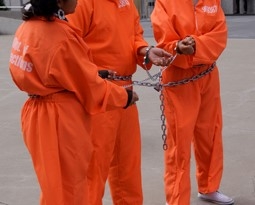Sleep-Deprived + Hungry + Degraded = Fair Hearing?
Page Media

Every weekday morning, buses carrying dozens of people detained by Immigration and Customs Enforcement (ICE) pull up to the immigration court building in downtown San Francisco. One by one, the passengers emerge from the bus wearing jumpsuits and metal handcuffs, belly chains, and leg irons. Some people stumble or fall getting off the bus due to the shackles. Armed guards escort them to holding cells, where they wait their turn to appear before a judge.
While immigration detention is supposed to be “civil” detention, as opposed to incarceration as punishment for a crime, the conditions that immigrants experience on those buses are anything but civil. Immigrants are pulled out of bed in the middle of the night and placed in painful metal shackles for up to five consecutive hours while making the trip from distant county jails to San Francisco. There is no drinking water available during the lengthy ride, women have no access to a restroom, and some people vomit on themselves and sit in their own vomit for the rest of the trip. Once they get to San Francisco, the water in the holding rooms is often discolored and the food is barely edible, so many do not eat or drink water before giving life-altering testimony.
Sleep-deprived, sore, hungry, dehydrated, and demoralized, immigrants must appear in court to plead their case before an immigration judge, often without a lawyer to represent them. Transgender immigrants and other survivors of past violence recount their traumatic experiences in detail on the stand. They face deportation to countries where their lives are in danger if their testimony is deemed not credible due to their demeanor or inability to remember exact details consistently. But how can they deliver convincing testimony when physically and emotionally drained? Clearly, the way ICE transports immigrants to court gravely impacts the fairness of their hearings and re-traumatizes survivors of violence.
In the afternoon, people are re-shackled and the transportation process repeats in reverse, leaving many with bruises on their wrists and ankles. Sometimes the vehicle stops at the airport where distraught immigrants are pulled off to be deported, while others who are still fighting their cases are forced to watch and imagine themselves being placed on a deportation plane.
These conditions do not reflect a civil detention system, but rather a system designed to punish and to force people into submission. That’s why the ACLU of Northern California and Transgender Law Center, joined by 22 other organizations, submitted a letter today to ICE officials seeking an end to these degrading practices. In the letter, we call for safety, freedom from excessive shackling, adequate food and water, access to restrooms, and a reasonable amount of sleep for immigrants being transported to San Francisco. ICE’s failure to respect these basic human needs is unacceptable in a country that values due process and human dignity.
This post was co-authored by Jenny Zhao, Attorney/Liman Public Interest Fellow at the ACLU of Northern California and Olga Tomchin, Soros Justice Fellow at the Transgender Law Center.
